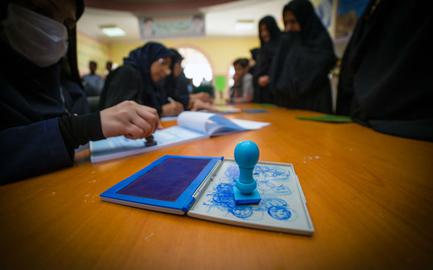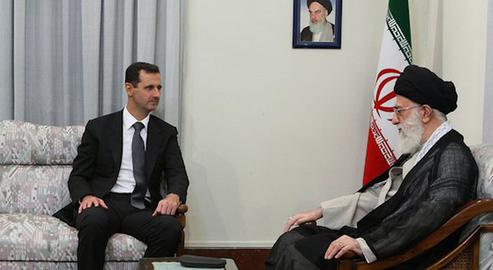Iran has been moving toward a more totalitarian and militarist government in which the Supreme Leader has absolute power. The plan deployed by the Supreme Leader Ayatollah Ali Khamenei and the Islamic Revolutionary Guards Corps (IRGC) seems to be to establish a dictatorship, similar to that of Saddam Hussein in Iraq or Muammar Gaddafi in Libya, rather than to maintain the original idea of an Islamic Republic, in which the Supreme Leader is the chief arbiter between different factions loyal to the regime.
As part of this trend, almost all parliamentary candidates who have ever expressed doubts about the total power of the Supreme Leader have been disqualified and will not be able to run in the next parliamentary elections, which will be held tomorrow, Friday, February 21, 2020. They include at least 41 representatives out of 290 current members of the parliament. These 41 individuals have questioned the expanding powers of the Supreme Leader and the IRGC in parliament, in public lectures and on Twitter (which is banned in Iran but is widely used by Iranian officials).
The main body that filters candidates is the 12-member Guardian Council. The Supreme Leader names six council members, who are clerics; the other six are legal experts and are selected by parliament. The Council also has the power to ratify or reject parliamentary bills. This vicious circle of power effectively means that only those candidates who fully support the Supreme Leader can enter parliament.
In the two decades after the 1979 Islamic Revolution, most candidates who believed in the “sanctity” of the Islamic regime, regardless of the particular strength of their individual beliefs, were allowed to register as candidates and to compete for parliamentary office. The founder of the Revolution, Ayatollah Ruhollah Khomeini, encouraged competition among his devotees as long as they were loyal to him. But his successor, Ali Khamenei, who replaced Khomeini after his death in 1988 and is still Supreme Leader today, has become increasingly less tolerant of different factions within the system. Khamenei’s intolerance of competing ideas has rendered Iran’s parliament ineffective and largely ceremonial in recent years. It is an institution filled with lethargic, ideologically-driven or corrupt members; in many cases, members are both ideological and corrupt.
Many current members of parliament (MPs) support the regime’s hardline faction and are ideologically devoted to the Supreme Leader. There are also those who are happy to be in parliament for the corrupt money-making opportunities it can offer. Similar to other countries, Iranian parliamentarians can bring forward bills to benefit certain businesses or industries in their constituencies. And like many other corrupt institutions, several MPs have accused each other of corruption, only to be counter-accused of corruption themselves. According to a spokesperson for the Guardian Council, many representatives have been disqualified because of financial corruption.
Strong Tradition of Voting Could be at an End
There have been some exceptions. MPs such as Mahmoud Sadeghi have felt obliged to speak out against the Revolutionary Guards’ gradual takeover of the country and the expanding power of the Supreme Leader. Sadeghi is the son of a “martyr,” and has been part of the Islamic Republic aristocracy since its earliest days. He is among the candidates who have been disqualified for the 2020 elections.
Mahmoud Sadeghi’s father, Mohammad Hossein, was a cleric and a student of Ruhollah Khomeini. Sadeghi the father was a member of the first parliament after the revolution. He was killed in a bombing by a terrorist group in July 1981. After his father’s death, Mahmoud Sadeghi junior studied in a seminary, became a cleric and has always held an official government position. Sadeghi is a “reformist” MP and in recent years has been a leading critic of the Iranian judiciary, whose chief is also assigned by the Supreme Leader.
According to two disqualified MPs I spoke with yesterday, who wish to remain anonymous because of the dangers of speaking about a sensitive matter, the disqualifications intensified after the November protests, during which hundreds of people were killed.
“Before the November protests, we had some constructive conversations with members of the Guardian Council, as well as with the Revolutionary Guards and the Ministry of Intelligence,” says one disqualified MP. “Our collective understanding was that allowing different opinions is one of the reasons for the survival of the Islamic Republic. Despite all our regional and international enemies, our government has managed to survive because the Supreme Leader has traditionally allowed different factions within the family of the Islamic Republic to have different opinions and argue about those opinions in public as long as we didn’t condone regime change.”
But according to this disqualified MP, after the November protests, when many parliamentarians began asking about the number of those killed in their own constituencies, the Guardian Council and the Revolutionary Guards decided to adopt a new policy.
“They’ve established a more draconian qualification system, by which they can disqualify a candidate for a tweet,” says the disqualified MP. “They want to create a more homogenous parliament with MPs who remain silent either for ideological or financial reasons.”
The Islamic regime has always prided itself on its parliamentary elections, which have been held every four years since 1980. In order to prove the popularity of the system, the regime has always pointed to the number of people who have participated in these elections, even during the 1980-1988 Iran-Iraq war. Participation rates have usually been between 50 and 70 percent of eligible voters; in the 2016 election, 61.83 percent of eligible voters took part. It is true that many people who took part in the elections either supported the current government or at least did not want it to change. But there are other factors involved when it comes to the high voting turnout. One is the fact that voters’ paper ID cards are stamped at polling stations — and there have been rumors since 1979 that those who do not have such a stamp on their cards could suffer discrimination at work and university.
But the current parliament’s ineffectiveness may change voting patterns. “Any participation rate lower than 50 percent will be interpreted as a failure,” says another disqualified MP. “The lowest percentage was in 2008 during Mahmoud Ahmadinejad’s presidency, when he had alienated many citizens from the government.”
The main failure of the current parliament was its inability to confront the Revolutionary Guards after the Guards killed dozens of protesters in January 2018 and hundreds more in November 2019. Many Iranians asked for regime change during the recent protests; even some of the most loyal “reformist” members of the regime said they were not going to participate in the upcoming elections.
“There are off-the-record surveys that show many people across the country, especially in provinces with large numbers of religious minorities, will not take part in the election,” says a third disqualified MP. “Even some members of my family, who have never missed voting in an election in their lives, are thinking about boycotting the upcoming elections.”
In early February, a pro-government survey showed that 83 percent of respondents said they are not going to vote. The survey was removed from the site and conducted again. The second time, 68 percent of respondents said that they will not vote. The second survey was also deleted within an hour.
On February 5, Supreme Leader Ayatollah Khamenei asked all Iranians — “even those who do not support me,” he said — to take part in the upcoming parliamentary elections as a patriotic act. But his plea may backfire and delegitimize his reign even further.
“Playing different factions against each other has been the Supreme Leader’s main stock in trade,” says one of the disqualified MPs. “I’m not sure how he can last in his position if there is only one group in power. There will be no one to blame, no safety valve and, alas, no future.”
visit the accountability section
In this section of Iran Wire, you can contact the officials and launch your campaign for various problems

























comments